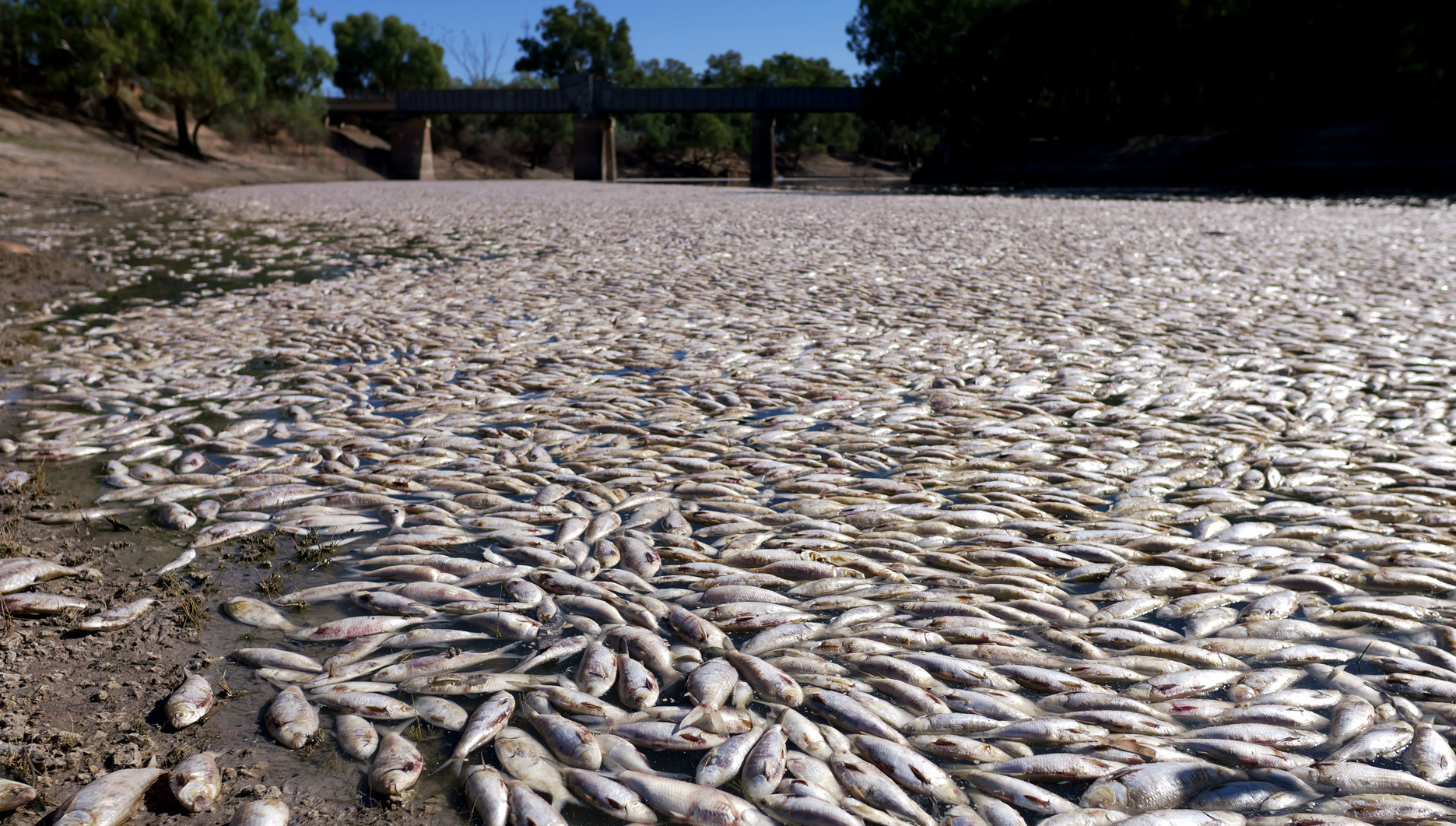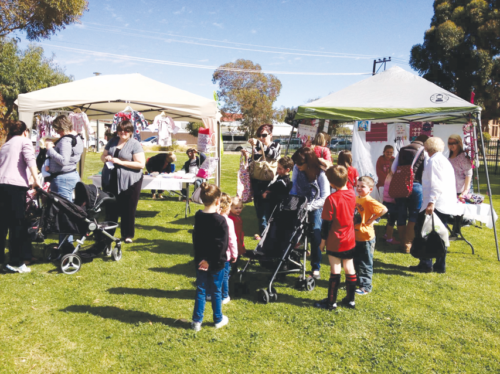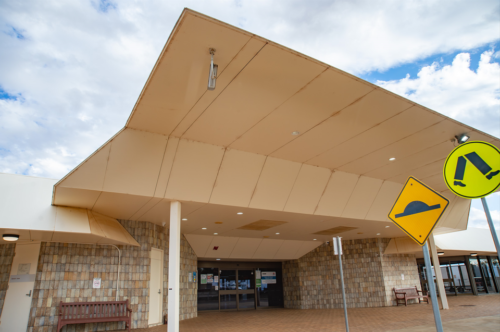By Dan Schulz
The Great Darling-Baaka, the lifeblood of far west NSW is once again blanketed in dead fish with locals disgusted by what some say are the management decisions that led to this disaster.
There are claims the river is dying, with one expert saying it is being ‘de-graded’ due to over extraction of water upstream.
The blanket of dead fish currently stretches more than 30km at Menindee and was first noticed on Friday.
It comes as some residents are only just returning to their homes as floodwater recedes from town.
Authorities have identified the cause as low oxygen levels attributed to hypoxic blackwater, a phenomenon that can occur naturally when floodwaters recede from the floodplain,s bringing nutrient rich debris into the river channel.
But the scale of this mass fish kill has locals furious at the suggestion this could be ‘natural’.
Menindee resident Ross Files who still hasn’t returned to his flood damaged home, was born on the river in 1939 and he recalls when he pumped untreated water straight from the river for drinking and wash.
“I’ve seen a lot of floods, but this was the biggest and the quickest, because it was man-made, and it was the filthiest.
“And I’ve seen a lot of fish kills but never to this extent. The filthy blackwater that came down is the first time I’ve ever seen that as bad as it is. This river was still in flood and the water in the river wasn’t fit for human consumption.
“I’ve been here for 85 years, and it wasn’t until after cotton was established that I’ve seen fish kills. They’ve destroyed this river; they’ve turned it into a sullage drain.”
It’s the second time in four years that Menindee resident Barb Quayle of the Barkindji Elders Group has seen her river carpeted with dead fish. Deoxygenated water killed millions of fish in 2018 and 2019, an event which was attributed to low inflows to Menindee due to drought, and exacerbated by excessive extraction of low and medium flows upstream of Bourke.
“It’s not like it was before in 2019, this time we’ve got three or four more the number of dead fish in the system.
“For them to turn around and say this is natural, its wrong, it’s not natural.”
“These fish are our totems of the Barkindji people along the river so it’s very, very sad to see this happening to our system again.”
An Emergency Operations Centre was established at Menindee on Sunday to coordinate multi-agency operations in response to the fish kills, provide drinking water to residents and to coordinate the removal of decaying fish from the river.
A community meeting was organised by NSW Police yesterday – Tuesday – at the Menindee Town Hall with representatives from the relevant water agencies; DPIE Water, WaterNSW, DPI Fisheries, EPA, Central Darling Shire, and Essential Water.
The meeting was supposed to address community concerns about water quality but quickly shifted to NSW water policy which privileges upstream irrigation over downstream environmental needs and human critical need, and the recent mismanagement of the Menindee Lakes flood event by WaterNSW and the subsequent mass fish kill.
President of the Darling River Action Group, Ross Leddra says that river communities warned of poor water quality upstream months ago, with dead fish being reported at Walgett in January and downstream of Bourke in February, as blackwater made its way toward Menindee.
“They’ve got to treat the Darling system as a whole between Bourke and Wentworth. There were fish kills in Louth and Tilpa weeks ago and it was going to pick up.”
“They’re not proactive, they’re reactive,” says Ross Leddra, “there are no preventive measures, which gets back to management, the whole box and dice starts and finishes with management.”
After the 2018/19 mass fish kills the Federal government pledged $70 million toward initiatives recommended by a scientific panel that investigated the fish kills in the lower Darling River. $25 million was promised towards metering in the Northern basin, and promises for better monitoring of water quality, projects to improve fish passage at existing weirs and regulators and a fish nursery at Menindee.
None of these projects have been realised.
“To me the headline written here should be ‘incompetence,’” says Mr Leddra.
“There’s no other explanation. Instead of things improving they’re getting worse, you only have to look at the numbers. It’s indescribable.”
Barb Quayle’s 82-year-old mother was one of the residents whose house was flooded in the most recent event, and she is still yet to return to her devastated home.“What they did is they opened the gates in a hurry and people’s homes were flooded, people are still out of their homes.”
CALL FOR INQUIRY
This has led to calls for an inquiry into WaterNSW’s management of the flood.
Late response times and poor monitoring of the impact of flows from Talywalka creek led to predicted river heights changing by a meter without adequate warning, impacting properties on the river.
For some residents such as Ross Leddra, he believes the poor operational management of Menindee Lakes has impacted the health of the river downstream of the Main Weir, contributing to the fish kills.
“Once again: reactive, far too late, and they don’t listen… and to this event now, it’s only been pure panic and reaction, and this fish kill is a result.”
Member for the Greens in the NSW Upper House, Cate Faehrmann who attended yesterday’s meeting, told the Barrier Truth, “The river is dying and the community knows it and the community has been treated so disrespectfully by government officials.”
“This is one of those crises that should lead to a ground-breaking inquiry, a huge review of government policy decisions and a completely different way of managing water in this country.”
She has told the Truth that if she is re-elected in the NSW election, she will be looking to establish an inquiry into recent events, including the floods in Menindee as well as how these fish kills occurred.
“This means looking at the science, the overallocation, the weirs, the regulation, and looking at the fact that the fish couldn’t escape because the barriers were shut.”
“And that also includes policy by WaterNSW.”
Bill Johnson, Director of Water Policy Consultancy Slattery and Johnson, an ecologist with 30 years of experience in the Northern Basin, believes this most recent fish kill is a symptom of a system that has been degraded by over-extraction.
“Deaths always occurred in the periphery of the system,” Mr. Johnson told the Truth, “When you get massive hydrological events there are always going to be things caught out. But what we are getting now are mass deaths in parts of the system that are supposed to be secure.
“Really it is the way our society manages these rivers and the cause of this is the extraordinary amount of water that is taken out of the rivers in the Northern Basin for irrigation.
“Once you start getting deaths like this at Menindee, and plus recent deaths on the Macquarie, it’s the sign of a system that is collapsing ecologically and so you are going to get deaths moving into what is the heart of the system and conditions in the heart of the system that can no longer support life.”
The scale of this event remains to be seen and with so much decomposing biomass in the system, it’s likely we will see more fish die in coming days.










